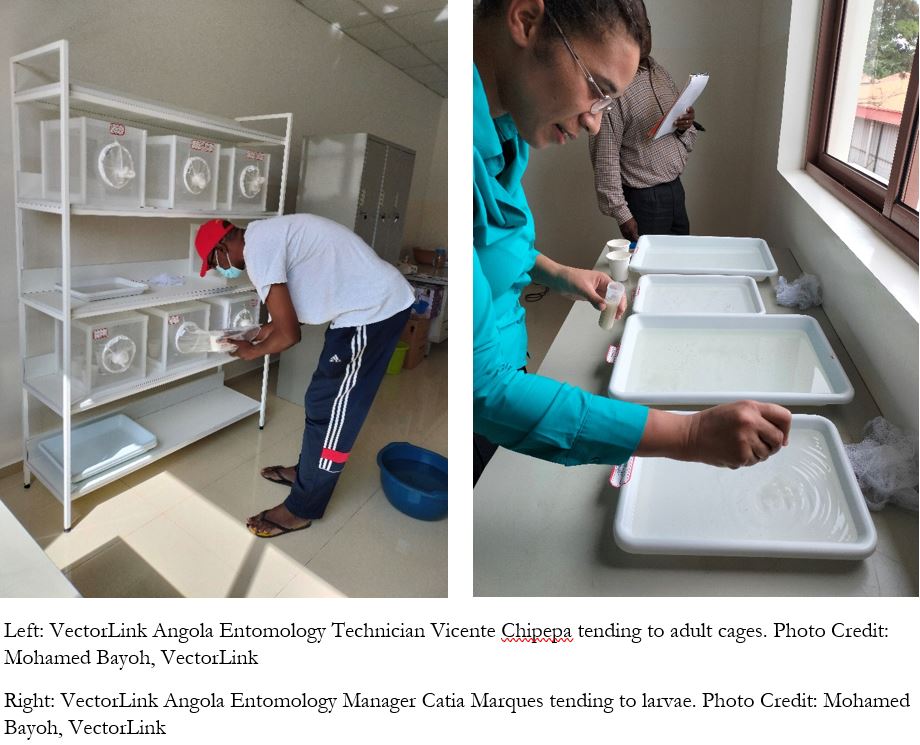 A susceptible (non-resistant) colony of malaria-transmitting mosquitoes is critical for various entomological monitoring activities, including testing insecticide residual efficacy of IRS and ITNs, and insecticide susceptibility assessments. Countries that have established and maintained a susceptible colony of mosquitos are one step closer to sustainability and being able to conduct these informative analyses themselves. For this week’s Monday Motivation, we’re looking at how VectorLink Angola is helping to move their partners toward more sustainable malaria control efforts.
A susceptible (non-resistant) colony of malaria-transmitting mosquitoes is critical for various entomological monitoring activities, including testing insecticide residual efficacy of IRS and ITNs, and insecticide susceptibility assessments. Countries that have established and maintained a susceptible colony of mosquitos are one step closer to sustainability and being able to conduct these informative analyses themselves. For this week’s Monday Motivation, we’re looking at how VectorLink Angola is helping to move their partners toward more sustainable malaria control efforts.
ITN distribution is the major vector control intervention in Angola and ITN durability studies are ongoing. The National Malaria Control Program (NMCP) recognized the need for a susceptible colony to conduct these analyses and engaged VectorLink to support their efforts.
In February of this year, the VectorLink Angola team, led by Entomology Manager Catia Marques and supported by Senior Technician Vicente Chipepa, received An. coluzzii mosquito eggs from the Vector Reference Laboratory at the National Institute for Communicable Diseases in South Africa. The initial An. coluzzii cohort allowed the team to optimize the rearing conditions (such as temperature and humidity) needed to maintain the colony at the insectary located on the Instituto de Combate e Controlo das Tripanossomíases (ICCT) premises in Luanda.
With insectary conditions achieved and normalized using An. coluzzii, the team gained confidence in maintaining a colony and a few weeks later, a batch of eggs of An. gambiae s.s. Kisumu strain from the entomology branch at CDC Atlanta were hand-carried to the country.
A few larval trays became several larval trays, and a few cages became several cages. As of April, about 350 susceptible mosquitos are being maintained by the team. The An. coluzzii colony now includes 6th generation mosquitoes while the An. gambiae colony has reached the 5th generation. Throughout the process, VectorLink Angola staff have been shadowed by ICCT staff, with the goal that ICCT will eventually maintain the colony themselves.
Both colonies will be moved to a modern insectary space currently under construction at ICCT, which is expected to be completed later this year. The hope is that the insectary will serve as the bioassay test site for ITN durability monitoring projects, chlorfenapyr insecticide susceptibility monitoring, and for any future insecticide bioassay needs. ICCT will share data generated by these tests on the reference colonies with the NMCP to help inform vector control decision-making.
Excellent work, VectorLink Angola! What a way to wrap up activities.


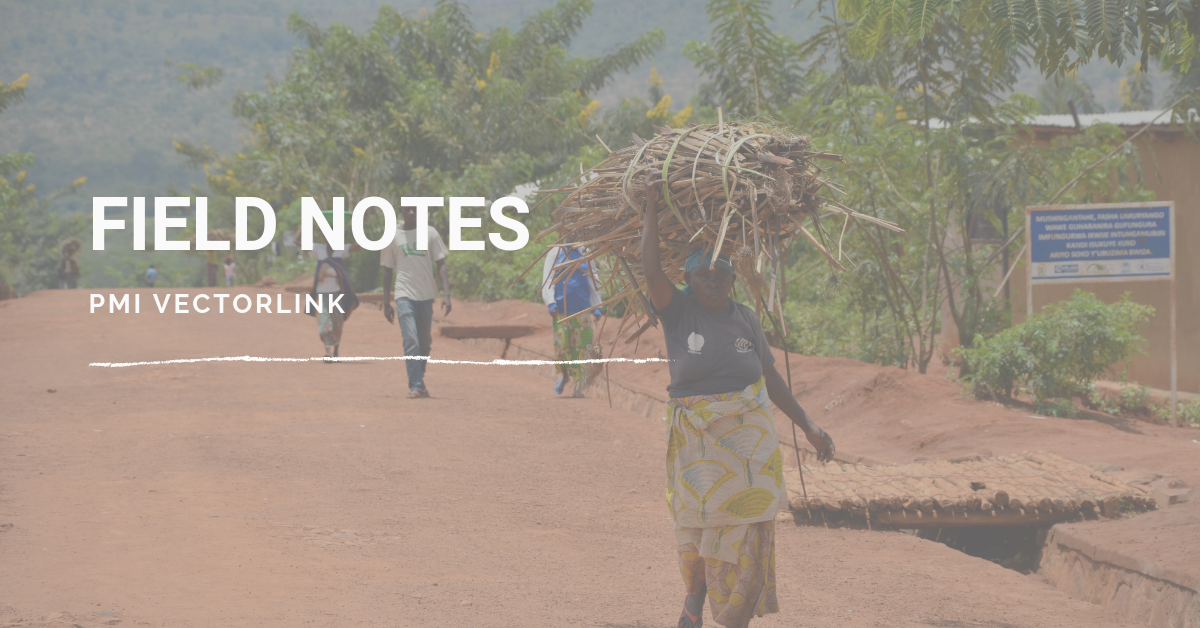
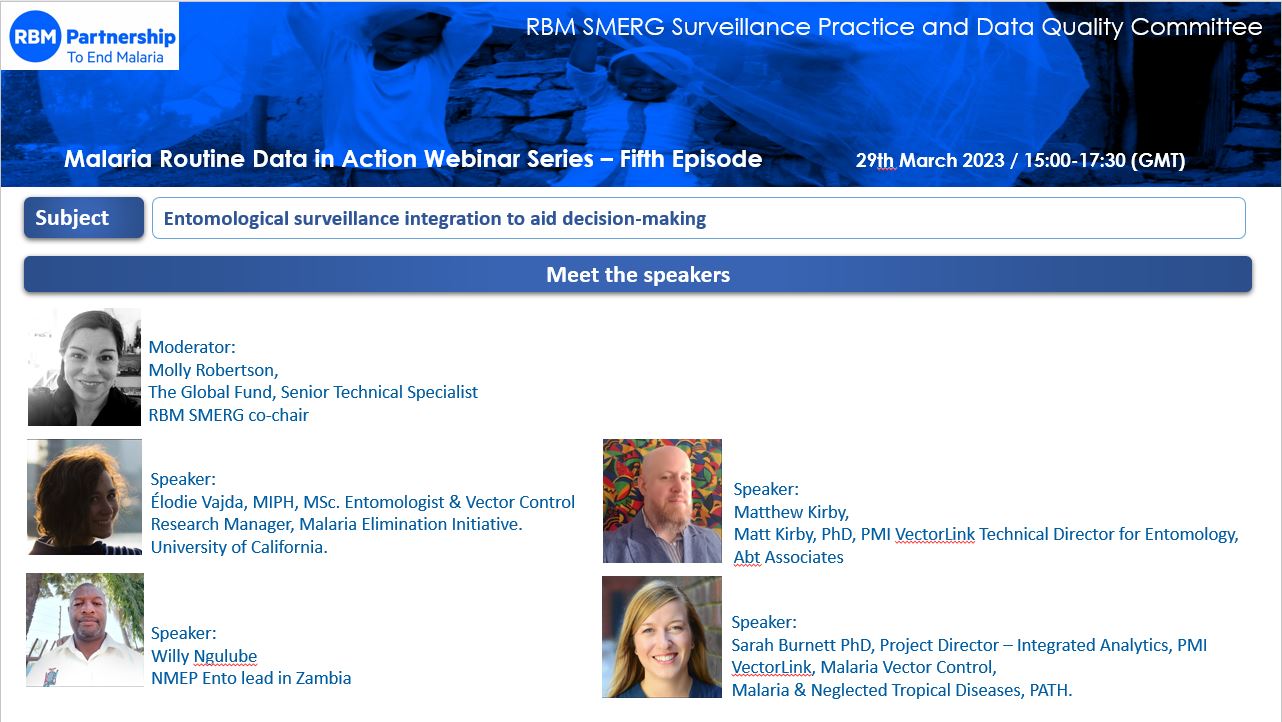 As a member of the RBM Partnership To End Malaria, PMI VectorLink plays an active role in sharing our latest knowledge about vector control with the larger global malaria community. This week’s Monday Motivation shines the spotlight on our recent participation in the “Malaria Routine Data in Action Webinar Series,” organized by the RBM Surveillance, Monitoring and Evaluation Working Group (SMERG) Surveillance Practice and Data Quality Committee. Kudos to our Integrated Data Analytics Lead Sarah Burnett and Technical Director Matt Kirby, who—along with Zambia’s NMEP Entomology Lead Willy Ngulube—presented on PMI VectorLink’s experiences in integrating entomological data for vector control decision-making.
As a member of the RBM Partnership To End Malaria, PMI VectorLink plays an active role in sharing our latest knowledge about vector control with the larger global malaria community. This week’s Monday Motivation shines the spotlight on our recent participation in the “Malaria Routine Data in Action Webinar Series,” organized by the RBM Surveillance, Monitoring and Evaluation Working Group (SMERG) Surveillance Practice and Data Quality Committee. Kudos to our Integrated Data Analytics Lead Sarah Burnett and Technical Director Matt Kirby, who—along with Zambia’s NMEP Entomology Lead Willy Ngulube—presented on PMI VectorLink’s experiences in integrating entomological data for vector control decision-making.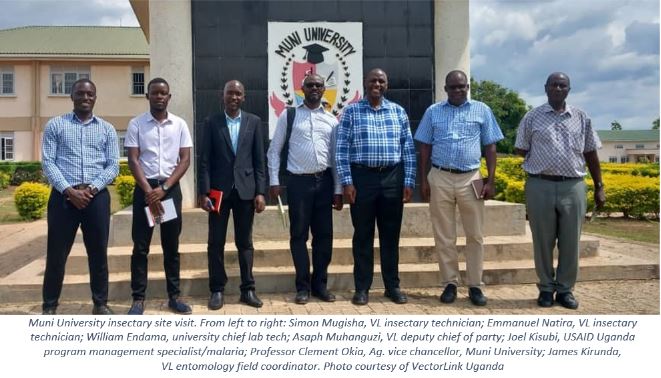 We all know strengthening in-country capacity goes hand-in-hand with ending malaria. For our first Monday Motivation, we’re highlighting the PMI VectorLink, now Evolve, Rwanda team for transferring necessary laboratory equipment, including a real-time PCR (RT-PCR) machine, to the Rwanda Biomedical Centre’s Malaria and Other Parasitic Diseases Division (MOPDD).
We all know strengthening in-country capacity goes hand-in-hand with ending malaria. For our first Monday Motivation, we’re highlighting the PMI VectorLink, now Evolve, Rwanda team for transferring necessary laboratory equipment, including a real-time PCR (RT-PCR) machine, to the Rwanda Biomedical Centre’s Malaria and Other Parasitic Diseases Division (MOPDD).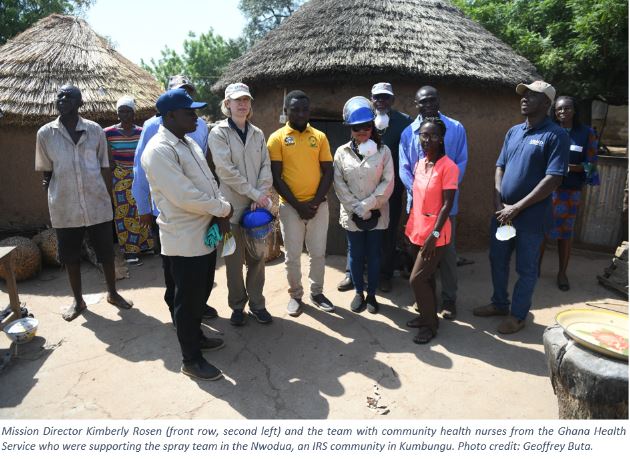 This week’s Fist Bump goes to the PMI VectorLink Ghana team who in the middle of their indoor residual spraying campaign, received a high-profile visit from the USAID/PMI team. USAID Mission Director, Kimberly Rosen along with PMI staff joined the VL Ghana team for a two-day visit, which took place on March 15 and 16. This was the mission director’s introduction to IRS and the science behind the intervention.
This week’s Fist Bump goes to the PMI VectorLink Ghana team who in the middle of their indoor residual spraying campaign, received a high-profile visit from the USAID/PMI team. USAID Mission Director, Kimberly Rosen along with PMI staff joined the VL Ghana team for a two-day visit, which took place on March 15 and 16. This was the mission director’s introduction to IRS and the science behind the intervention.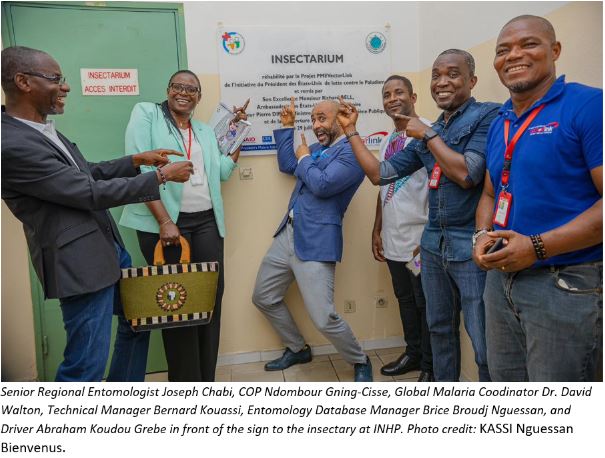 This week’s Fist Bump goes to the PMI VectorLink Côte d’Ivoire team, who had an exciting visitor last week. The U.S. Global Malaria Coordinator Dr. David Walton was in Côte d’Ivoire from March 13 to 19, and got to see the team’s activities, which included a visit to the renovated insectary at the Institut National d’Hygiene Publique (INHP).
This week’s Fist Bump goes to the PMI VectorLink Côte d’Ivoire team, who had an exciting visitor last week. The U.S. Global Malaria Coordinator Dr. David Walton was in Côte d’Ivoire from March 13 to 19, and got to see the team’s activities, which included a visit to the renovated insectary at the Institut National d’Hygiene Publique (INHP).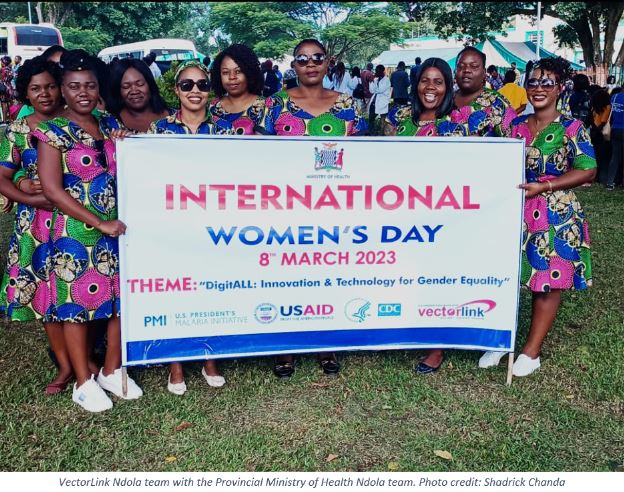 This week’s Fist Bump goes to VectorLink Zambia for participating in the government’s International Women’s Day celebration! The Zambian government declared International Women’s Day 2023 a public holiday to honor the contribution of women to the country’s overall development. Honoring this year’s theme, DigitALL: Innovation and Technology for Gender Equality, the aim of the event was to recognize and celebrate women and girls who are championing the advancement of transformative technology and digital education.
This week’s Fist Bump goes to VectorLink Zambia for participating in the government’s International Women’s Day celebration! The Zambian government declared International Women’s Day 2023 a public holiday to honor the contribution of women to the country’s overall development. Honoring this year’s theme, DigitALL: Innovation and Technology for Gender Equality, the aim of the event was to recognize and celebrate women and girls who are championing the advancement of transformative technology and digital education.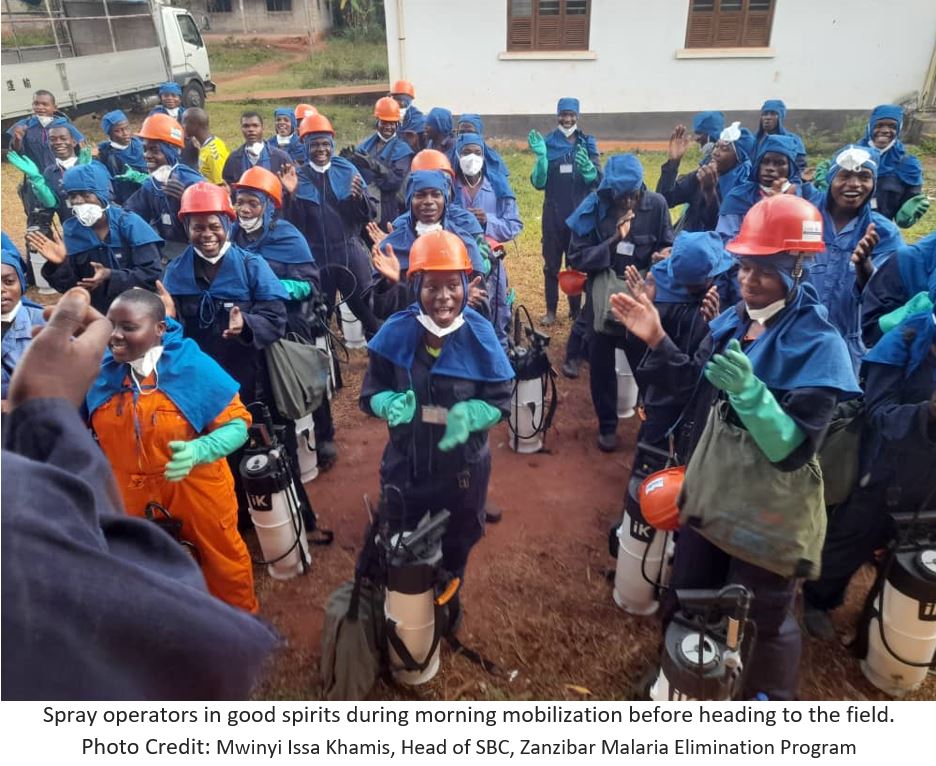 VectorLink Tanzania closed its Zanzibar office in June 2022, handing over responsibility for vector control interventions including IRS to the Zanzibar Malaria Elimination Programme (ZAMEP). In January 2023, due to leftover Sumishield insecticide previously acquired by the Global Fund, ZAMEP decided to implement an IRS campaign, and requested VL Tanzania’s technical support. This week’s Fist Bump goes to VL Tanzania for assisting ZAMEP to implement IRS at minimal cost.
VectorLink Tanzania closed its Zanzibar office in June 2022, handing over responsibility for vector control interventions including IRS to the Zanzibar Malaria Elimination Programme (ZAMEP). In January 2023, due to leftover Sumishield insecticide previously acquired by the Global Fund, ZAMEP decided to implement an IRS campaign, and requested VL Tanzania’s technical support. This week’s Fist Bump goes to VL Tanzania for assisting ZAMEP to implement IRS at minimal cost.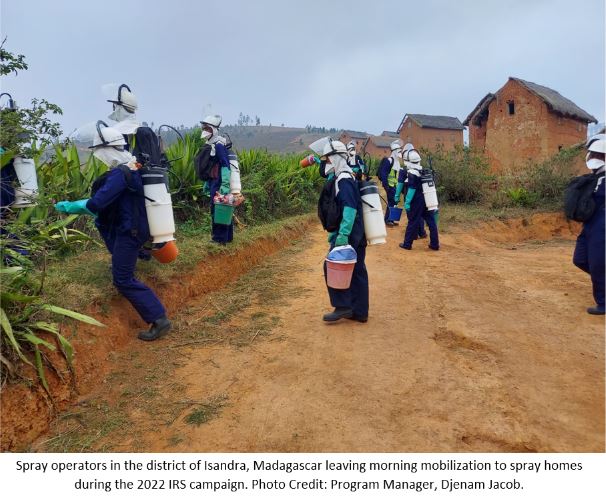 Many of us have heard the phrase “work smarter not harder.” VectorLink Madagascar put that into action for their past IRS campaign. This week’s Fist Bump goes to VL Madagascar, especially Operations Manager Rodrigue Anagonou, for using spray progress rate stratification to maximize the impact of its IRS campaign.
Many of us have heard the phrase “work smarter not harder.” VectorLink Madagascar put that into action for their past IRS campaign. This week’s Fist Bump goes to VL Madagascar, especially Operations Manager Rodrigue Anagonou, for using spray progress rate stratification to maximize the impact of its IRS campaign.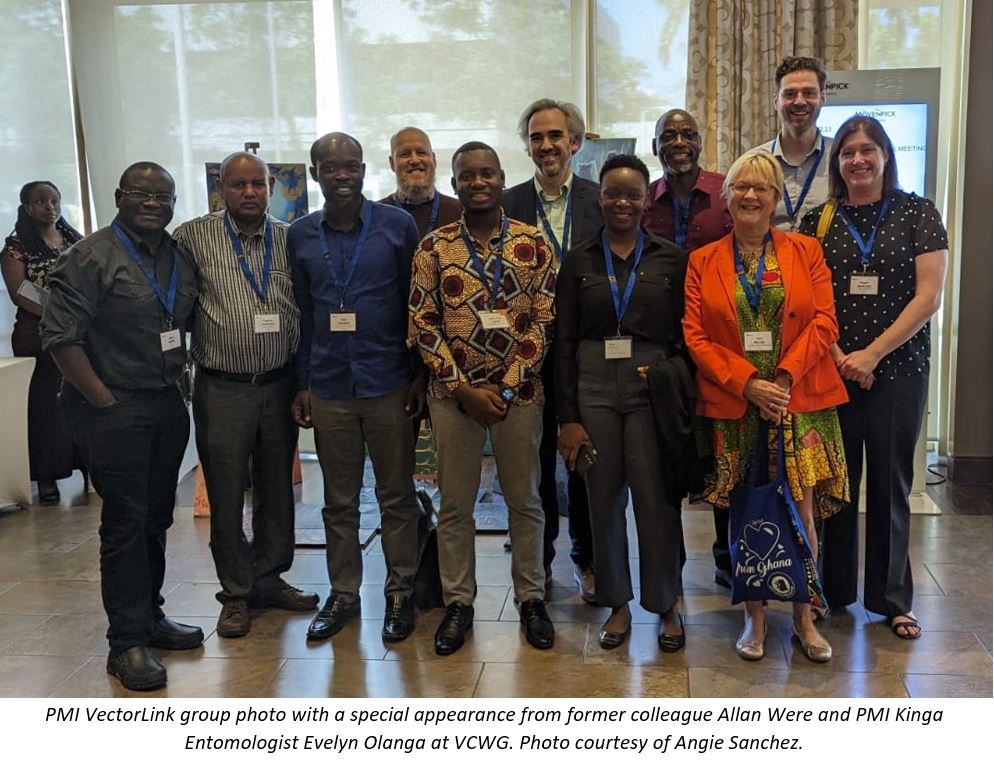 After a successful showing at the RBM Partnership’s Vector Control Working Group’s annual meeting last week, it’s only fitting that those who represented PMI VectorLink so well get a Fist Bump.
After a successful showing at the RBM Partnership’s Vector Control Working Group’s annual meeting last week, it’s only fitting that those who represented PMI VectorLink so well get a Fist Bump.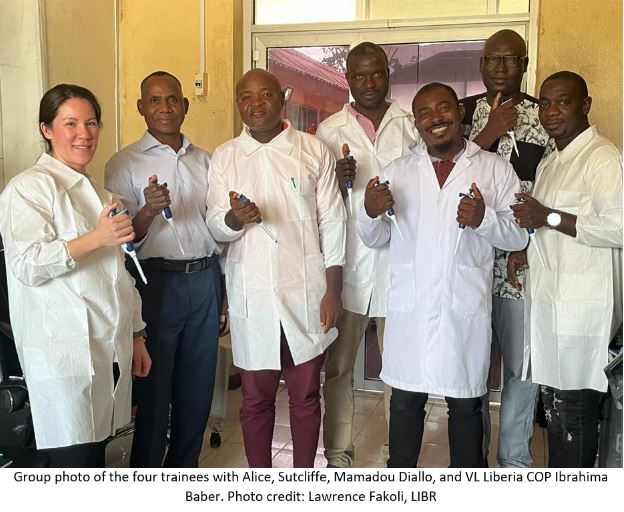 Laboratory identification of mosquito species, bloodmeal source, and genetic markers of resistance fill crucial knowledge gaps needed to make well-informed vector control decisions. In Liberia, PMI VectorLink has worked with the Liberian Institute for Biomedical Research (LIBR) over the last four years as they processed mosquito samples using enzyme-linked immunosorbent assay (ELISA) to detect the presence of malaria parasites in the mosquitoes. This week, we’re celebrating PMI VectorLink Liberia for their work in facilitating the expansion of LIBR’s molecular entomology capacity to include polymerase chain reaction (PCR) tests, which will reinforce species identification from the field and expand knowledge on molecular mechanisms of insecticide resistance and bloodmeal host preference of malaria-transmitting vectors.
Laboratory identification of mosquito species, bloodmeal source, and genetic markers of resistance fill crucial knowledge gaps needed to make well-informed vector control decisions. In Liberia, PMI VectorLink has worked with the Liberian Institute for Biomedical Research (LIBR) over the last four years as they processed mosquito samples using enzyme-linked immunosorbent assay (ELISA) to detect the presence of malaria parasites in the mosquitoes. This week, we’re celebrating PMI VectorLink Liberia for their work in facilitating the expansion of LIBR’s molecular entomology capacity to include polymerase chain reaction (PCR) tests, which will reinforce species identification from the field and expand knowledge on molecular mechanisms of insecticide resistance and bloodmeal host preference of malaria-transmitting vectors.